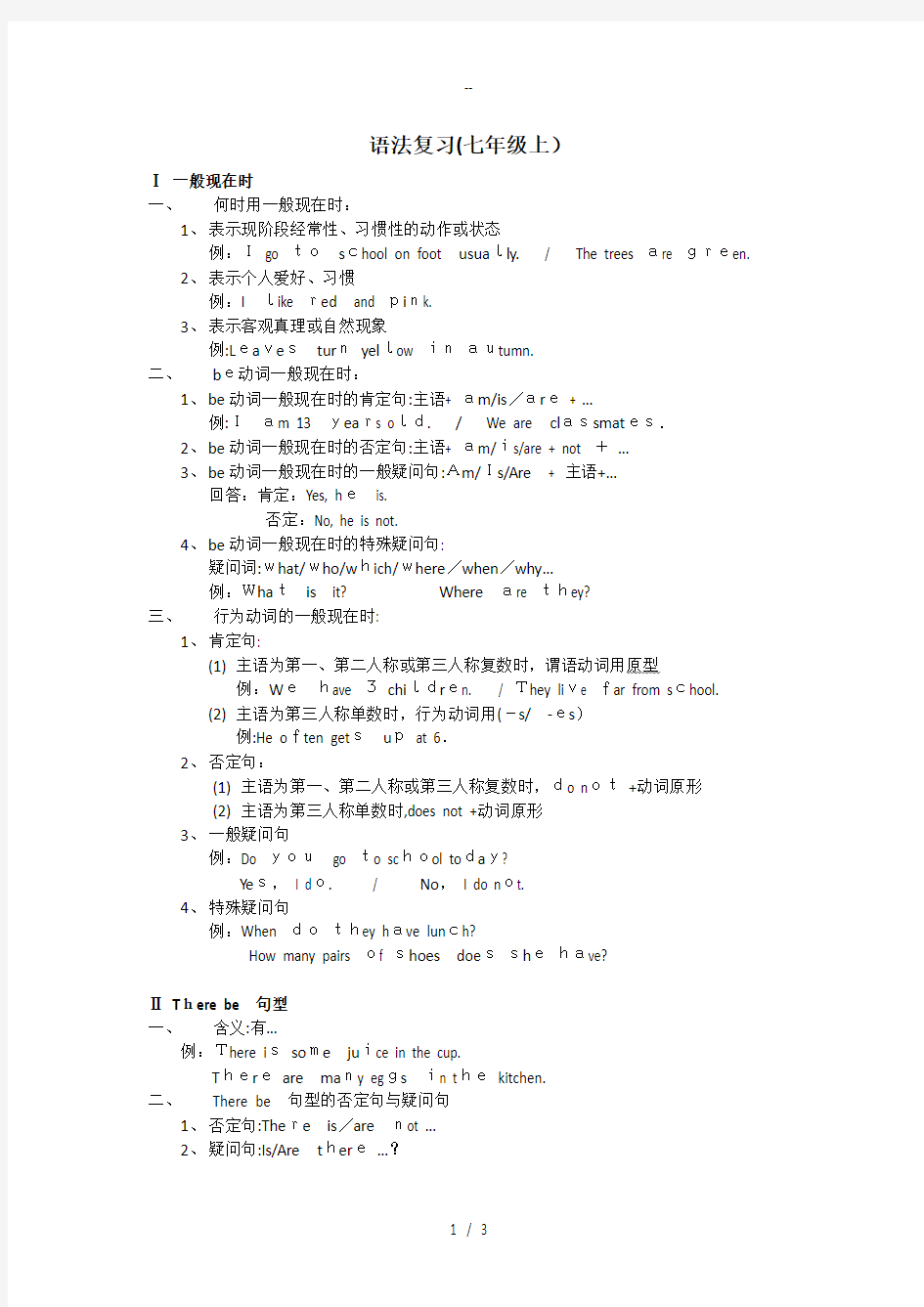

语法复习(七年级上)
Ⅰ一般现在时
一、何时用一般现在时:
1、表示现阶段经常性、习惯性的动作或状态
例:Igo toschool on foot usually./ The trees are green.
2、表示个人爱好、习惯
例:Ilike red and pink.
3、表示客观真理或自然现象
例:Leavesturnyellow inautumn.
二、be动词一般现在时:
1、be动词一般现在时的肯定句:主语+ am/is/are+ …
例:Iam 13years old./We are classmates.
2、be动词一般现在时的否定句:主语+ am/is/are + not +…
3、be动词一般现在时的一般疑问句:Am/Is/Are+ 主语+…
回答:肯定:Yes, heis.
否定:No, he is not.
4、be动词一般现在时的特殊疑问句:
疑问词:what/who/which/where/when/why…
例:Whatis it? Whereare they?
三、行为动词的一般现在时:
1、肯定句:
(1)主语为第一、第二人称或第三人称复数时,谓语动词用原型
例:Wehave 3children. / They live far from school.
(2)主语为第三人称单数时,行为动词用(-s/-es)
例:He often getsupat 6.
2、否定句:
(1)主语为第一、第二人称或第三人称复数时,do not+动词原形
(2)主语为第三人称单数时,does not +动词原形
3、一般疑问句
例:Do yougo to school today?
Yes,I do./ No,I do not.
4、特殊疑问句
例:When dothey have lunch?
How many pairs of shoes doesshehave?
ⅡThere be句型
一、含义:有…
例:There issome juice in the cup.
Thereare many eggsin thekitchen.
二、There be句型的否定句与疑问句
1、否定句:There is/arenot …
2、疑问句:Is/Are there…?
Ⅲ代词
一、人称代词
例:Isthat car yours?
回答:Yes,itis mine./ No,itishers.
例:Arethese books yours?
回答:Yes, they are ours./ No, theyare theirs.
②作表语:Whathe wants isthis.
③作宾语:You like this butIlike that.
④作定语:Whatisthe useof those books.
*指示代词的特殊用法:
为了避免重复,可用that/those代替前面提到过的事物,但this/those不用于这种替代。例:The weather in Beijing is worsethan that in Kunming.
The radios made inShanghai are asgood asthose made in Tianjin.
四、反身代词
五、不定代词
All三者及三者以上/both两者之间/ each两者及两者以上/ every 三者及三者以上
Some用于肯定句或期待对方肯定回答时(Do you likesomewater?)
Any一般用于否定句和疑问句,但在表示任何或任何一个时也用于肯定句(Come any day.) Many用于修饰可数名词/much用于修饰不可数名词
A few 修饰可数名词/ a little修饰不可数名词
Few和little都有否定意味(There is few mistakes inhis test./There islittle wat er in the cup.)
Either两者之间,用于肯定句/neither两者之间,用于否定句
Other只能与复数名词连用,“其他的”,other+名词=others
固定搭配:one…theother… /some…the others…
*例:Some pencilsarered, others(=other pencils)aregreen.(说明还有一些别的颜色,比如黑色、蓝色等。)
Ⅳ现在进行时
一、进行时的肯定句(be动词+v-ing)
1、现在进行时的肯定句:翻译:我正在上一堂英语课。
2、过去进行时的肯定句:表示过去正在进行的动作。
二、进行时的否定句(be动词后加not)
三、进行时的一般疑问句
四、进行时的特殊疑问句
Ⅴ必记固定搭配
enjoy doing sth 享受或喜欢做某事?be busy doing sth / be busy with s
th忙于做某事
It`s+adj +to do sth .做…是…的
try doing试着做某事?ask sb. to do叫某人做某事
forget doing 忘记已经做过的事
forget to do忘记要做某事?remember to do 记得要做某事(还没做过)?remember doing 记得做过的事?let sb do 让某人做某事
make sb do 使某人做某事?like doing sth 喜欢做某事(习惯上的)
begin/start to do sth /start with/begin with开始做某事
finish doing sth完成…?(一般现在时态)be doing 正在做...
would like to do (表示意愿)
spend......(in) doing sth 花费....做...?look forward to doing sth 期待做某事
want to do sth 想要做某事
decide to do sth 决定...?It takes sb sometime to do sth 花费某人多少时间做某事
be going to do sth/will do(一般将来时态)将要做某事?Thank for doingsth 感谢做某事
happen to sb.某人发生某事
happen to do sth.碰巧做某事